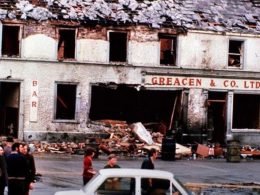By Gary Mulcahy
FIGURES RELEASED in January reveal Northern Ireland has seen the biggest annual rise in unemployment in 37 years. 12,000 extra people were without work in 2008 compared to 2007, with the total number officially unemployed now standing at over 36,000.
There was a massive rise in job losses in the final six months of 2008, with 10,000 new claimants since June. These figures, however, are an underestimation of the true extent of job losses. They do not take into account contractors and self-employed construction workers, nor the thousands of immigrant workers who have left the country to find work. Construction accounted for 44% of job losses last year.
Capitalist economists now predict that official unemployment will reach 50,000 by the end of the year. These right-wing economists though were caught completely by surprise at the scale of the recession and it is likely that that predication could well turn out to be overly-optimistic. It is possible unemployment could rise towards 60,000 this year.
Northern Ireland has been the worst affected part of the UK. Because of the over-reliance and dependency on the construction boom, the bursting of the property bubble and the slump in house prices has led to areas across the North experiencing a huge growth in unemployment. Magherafelt saw the biggest rise with a 183% increase in those signing on, Cookstown 135%, Dungannon 130%, Banbridge 102%, Ballymoney 99% and Limavady a 98% rise in unemployment.
Many businesses are carrying out huge attacks on workers’ wages, terms and conditions. In January, 40 workers at Montupet in Dunmurry were sacked. The remaining workforce will see a major pay cut through a reduction in hours. Similar attacks are happening right across the private sector. At a time when workers desperately need strong unions to defend jobs, wages and conditions, the reaction of the trade union leaders has been shocking. Their silence has been deafening.
In marked contrast, the response of rank and file Unite members at the Calcast factory in Derry was to take militant action by occupying their factory, which led to improved redundancy packages. The union leadership showed more energy in trying to end the occupation than any attempt to resist job losses. Workers facing job losses should take inspiration from the action of the Calcast workers and others who have taken on the bosses such as the Lindsey Oil refinery strikers and the Waterford Crystal workers who have also occupied their factory to defend jobs. If the union leaders do not take the lead in organising such action, then ordinary members should take the initiative themselves and appeal to workers across Ireland and internationally for support.
The failure of the capitalist market to secure jobs also points to the need for public ownership of companies which are slashing jobs. Companies could be run democratically and more efficiently by ordinary workers if they were nationalised to secure employment. With profits invested in research and development, cheap goods could be sold on the market, thus providing a sustainable source of unemployment. To provide a long-term solution, the struggle to defend jobs also needs to be linked to the transformation of society along socialist lines.









